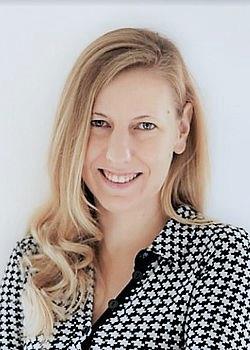In conversation with M&E Specialist Sarah Ulrich
July 10, 2019
“I always enjoyed being in direct contact with target groups of projects I evaluated, because I find it amazing and gratifying to hear about the change and impact they experience.” Monitoring and Evaluation Specialist Sarah Ulrich talks about her love for the M&E sector and how she views M&E as the facilitator in intersectoral collaborations. Read on for more interesting insights from Sarah!
A quick introduction
Which organisation do you work for?
I work part-time for aqtivator gGmbH, a philanthropic organisation supporting non-profit organisations (NPOs) with impact-scaling potential in the educational sector. In addition to that, I am a freelance consultant in the field of impact orientation and intersectoral partnering.
Which region(s) of the world have you worked in so far?
I am based in Germany but have occasionally worked as a consultant for organisations in other European countries.
Where did you like working the most?
There is no specific country I prefer but I love to experience the (working) cultural differences and similarities.
What is your favourite dish?
Pasta is guaranteed to make me happy!
What are your favourite leisure activities? (other than M&E, of course!)
I relish rock music and try to go to concerts at least once a month. I also play the guitar and sing in a band called TwoBricks which you will definitely not find on Youtube. ☺

M&E Specialist Sarah Ulrich talks about the power of monitoring and evaluation to enable partners with different sectoral backgrounds to come to a common understanding of their individual and the mutual idea of values and results.
Let’s talk about your career in M&E
How long have you worked in the M&E sector?
I have been working in this sector for eight years. Before that, I worked in research, diagnostics and methodology, which, I guess, is somehow close to M&E.
What inspired you to pursue a career in M&E?
It was by chance, really. Coming from a social psychological research background I have always been interested in field research methods and finding out about the cause-and-effect-mechanisms in practice.
When I joined Education Y (former buddY e.V.), a German NPO, it was a rather unexpected turn of my career path. I had the chance to further explore this interest in what I later found out was M&E in the role of an Internal Consultant for Quality Management and Evaluation and loved it right from the start.
Your most joyful or memorable moment related to your M&E work?
There have been various happy moments. For example, I always enjoyed being in direct contact with target groups of projects I evaluated, because I find it amazing and gratifying to hear about the change and impact they experience.
I was also extremely proud when I was told that quite a lot of people who are working in the field of Impact Orientation or M&E in German NPOs have been inspired by one of my talks or papers on how Impact Monitoring and Evaluation are more a matter of STARTING TO DO it, rather than endlessly revolving around questions of research methodology or the countless dilemmas of scientific validity of field research and qualitative data quality.
Your most frustrating or challenging moment related to your M&E work?
As a freelance consultant and M&E service provider, I always try to be very transparent about the limits and opportunities of impact orientation, especially in the intersectoral context. For instance, when I work with corporate clients, scientific hardliners or public administration, I find it rather demanding to ‘translate’ the logic of M&E in the context of social impact into their respective value system.
I graduated from Zeppelin University‘s executive Master course ‘Intersctoral Governance and Leadership’ in 2016. This has helped me a lot to understand the main challenges of intersectoral communication, especially when it comes to the interpretation and subjective value of data.
M&E in your perspective
What do you think are the biggest opportunities in M&E today?
I think that we have to challenge the idea that any sector can tackle major societal problems on their own. But collective and intersectoral impact projects and approaches are very complex. I think one of M&E’s biggest challenges but also biggest opportunities is to be a facilitator in intersectoral collaborations.
M&E experts are generally very good at formulating concise, SMART and unambiguous outcome and impact goals and coming up with persuasive, useful indicators. Thus they can enable partners with different sectoral backgrounds to come to a common understanding of their individual and the mutual idea of values and results. The data gathered by Monitoring and Evaluation thereby becomes a common language for intersectoral communication and a central premise for successful collective impact.
What do you think are the biggest challenges in M&E today?
I would really like to speak for more openness towards methodological creativity and diversity. As Chairperson of the Social Reporting Initiative e.V., the provider of the Social Reporting Standard guide for annual social reports, I have read countless annual reports of NPOs (worldwide) and come across a plethora of creative and clever methodical solutions for social Impact monitoring, evaluation and reporting (case studies, impact narrations, surveys, interviews, (big) data analysis, RCT trials, SROI reports etc.)
I think as long as it delivers meaningful results in terms of the output, outcome and impact goals and helps to gain insight into the success premises and effects of a project or program, there should not be a dispute about whether the evaluation method is ‘gold standard’ or not.
Are you aware of any emerging trends in the M&E sector? How do you feel about them?
As in a lot of aspects of our everyday life, I think, digitisation will play an important role in the M&E sector now and in the future. A lot of organisations are still unaware of their data potential or are still reluctant to explore it with regard to data privacy and data abuse.
With the emergence of more and more data sources, I believe, it’s also absolutely inevitable to have a concise Impact Logic Model (I-O-O-I) because to me it is the basis and frame for any data collection and analysis. It’s like a compass in a data jungle.
Although it’s really helpful to have deeper knowledge about research methodology, I would not necessarily count that as a key skill. But to work in M&E you ought to be creative, curious and receptive and have a hands-on-mentality. Analytical thinking, the flexibility to rethink and re-frame an aspect or idea and the ability to clearly and comprehensibly communicate issues in varying contexts are of great value as well. And – my personal major challenge – patience.
Digital M&E
Have you used any digital tools for M&E? How was your experience?
The experiences I have made with digital tools have proven to me that in certain areas we are still far from a “digital society.” For instance, for project evaluations in schools, I always try to use digital surveys and the response rate is generally lower than if I hand out pen-and-paper-surveys, because of technical challenges (No Wi-Fi, no devices, scepticism towards clicking a link etc).
On the other hand are the data analysis options coming with digitisations literally making me giddy with joy. There are just so. many. possibilities! And I am very far from being an expert for digital data analysis (like for instance the folks at CorrelAid), but just really like how it has made things easier and swifter (as long as you have a good Impact Logic Model and therefore know what you’re looking for.)
Tips and recommendations
Do you have any advice for individuals who are thinking about starting a career in M&E?
Be prepared for a lifelong learning process, a lot of creativity and joy and a really fulfilling and valuable job. And if you can… learn a coding language (i.e. “R”) as early as you can. From personal experience I can tell you that the later you try, the harder it becomes.
Final words
What is the funniest reaction you’ve encountered when you told someone (maybe from outside the non-profit sector) that you were “working in M&E”?
I tried to explain it to my grandparents who are both 92 years old by now. It took me quite some time to get it across to them but when I finally succeeded, my Grandma explained, “Everyone should be doing that thing! Then nobody would ever make a mistake!”
Any final words to your colleagues in the M&E sector?
I have learned and continue to learn so much from each and every M&E person I ever came across so please get in touch because I’m eager to learn more.
Sarah Ulrich
Website – www.outcome-reporting.com
LinkedIn – Sarah Ulrich
Twitter – @sarah_civilian
We hope you enjoyed this interview with Ms. Ulrich. In case you have additional questions for M&E experts, do send them our way and we will more than happy to include them in the next edition of our interview with M&E Specialist.



